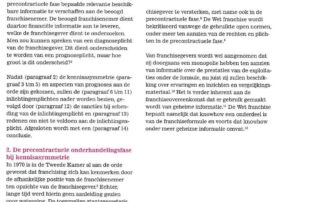Is it allowed to suspend payments?
Suspension is appropriate when a debtor (temporarily) postpones the fulfillment of his obligations because he has a counterclaim against his creditor, which his creditor still has to pay.
Suspension can take many forms, such as the garage owner who does not return a car to a customer after major maintenance because the bill has not been paid. However, it is most common for payment obligations to be suspended. For example, the franchisee who does not pay his franchise fee because the franchisor has not yet fulfilled certain agreements from the franchise agreement.
The question is whether suspension is allowed without further ado? The short answer is: no, you can’t just do that. Suspension of payments is only possible in special cases.
The right to suspend is regulated in article 6:52 of the Dutch Civil Code. This article contains a number of requirements that the suspension must meet, the most important of which are discussed here.
First of all, the person who wants to suspend his obligations must have a due and payable claim against his creditor and there must be sufficient cohesion between that claim and his own obligation. Coherence exists, for example, when the two obligations arise from the same agreement, such as, for example, from the franchise agreement on the basis of which the franchisee pays a fee to the franchisor and the franchisor provides a service to the franchisee.
Another important requirement is that the suspension must be ‘justified’. That means so much that suspension should only be allowed when it is reasonable and fair. Whether a suspension is reasonable and fair depends on the actual situation. In any case, do not suspend if the non-compliance by the franchisor is much smaller than the fulfillment of its own (financial) obligations.
In a franchise relationship, once the legal requirements have been met, and an injunction has been granted, you can state in a letter to your franchisor that you will not meet your obligations until the franchisor has fulfilled its obligations. The suspension is then a fact and ends when the franchisor has fulfilled its obligations.
In all this, it is good to realize what the consequences can be if you suspend unauthorized. If you invoke suspension, but it later turns out that this does not meet the requirements, you are committing a breach of contract with your franchisor. Always check whether the franchise agreement has not excluded an appeal to suspension. Always convince yourself that suspension is justified, so that you do not become liable for damages yourself!

Other messages
Article Franchise+: “Is the franchisor bound by the statutes of the franchisees’ association?” – mr. M. Munnik – dated November 11, 2021
Within a franchise organization it is not uncommon for franchisees ...
Article The National Franchise Guide: “Humps in the standstill period” – mr. T. Meijer – dated October 19, 2021
The Franchise Act has been seen by a large number ...
Unilateral changes to opening hours are prohibited from 1 January 2022
On July 14, 2021, a legislative amendment to the shopping ...
Litigation as a franchisees association.
The Eye Wish Opticiens franchisees have recently filed opposition to ...
Between the franchisor’s diagnosis and forecasting duty
In the leading legal scientific journal WPNR, Mr. Dolphijn a ...
Franchise+ article: “Violation of a non-compete clause will cost the franchisee dearly.” – mr. C. Damen – September 23, 2021
The fact that the violation of a non-compete clause included ...





